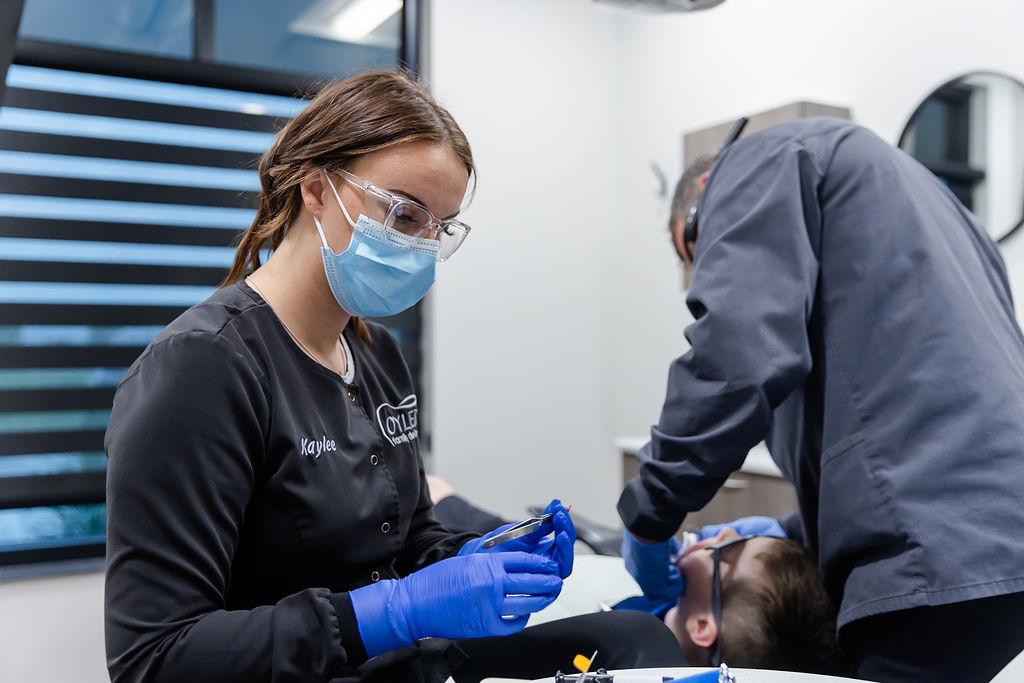Root Canals




The top priority of every dentist is the oral health of our patients. This is why our dentists at Oyler Family Dentistry always strive to help our patients preserve their natural teeth with a combination of preventative treatments and restorative dental care. In some cases, the best strategy for saving a patient's natural tooth is root canal therapy.
What Is a Root Canal?
Also commonly called endodontic treatment or root canal therapy, a root canal refers to a treatment designed to save a natural tooth by preventing the need for extraction.
A root canal is actually a part of oral anatomy. It is the canal-shaped structure within a tooth's root system. The root canal contains the pulp portion of a tooth's roots: soft tissues, nerve tissue, and blood vessels.
Root canal therapy is a treatment that removes the pulp from within the interior of a tooth and its root canals in order to prevent and address infection and decay. Once the pulp has been removed, the root canals are sterilized, filled, and sealed to strengthen and protect the tooth.
Why You Might Need Root Canal Therapy
Root canal therapy is recommended as a last resort effort to save a natural tooth that is far too compromised to be saved with a traditional dental filling or other type of restorative treatment. Patients need root canal therapy when the interior pulp of a tooth has been exposed and is at risk of developing a bacterial infection.
Patients tend to need root canal therapy in the following instances:
At Oyler Family Dentistry, we always recommend the most conservative and least invasive treatment options to our patients that will still be effective for maintaining their oral health.
What to Expect During Treatment: Is a Root Canal Painful?
Root canals have a reputation for being painful procedures. This reputation, however, is misguided and not based on reality. In reality, root canal therapy takes place with the treatment area fully numbed with local anesthetic. As a result, patients experience no pain or discomfort during their treatments. Following a root canal, any minor pain, swelling, or discomfort can be adequately addressed with a cold compress and/or over-the-counter non-steroidal anti-inflammatory medication.
Once the treatment area has been fully anesthetized, the dentist uses special tools to drill into the patient's tooth and remove the soft tissues (pulp) from the tooth's interior and root canals. We then clean and sterilize these internal structures before filling them with dental putty. The top of the tooth is then sealed and typically capped with a dental crown to help support and protect the natural tooth's structure.
Once the dental crown has been placed, the root canal treatment is complete. We recommend avoiding overly hard, spicy, or hot foods to ensure a smooth recovery, but patients can typically return to their regular activities right away after the procedure.
How Much Does a Root Canal Cost?
The cost of root canal therapy can vary significantly depending on a variety of factors such as the complexity of the case, the tooth being treated, and whether or not a patient has dental insurance. Typically, root canals are included in dental insurance coverage because they are considered necessary, restorative treatments. Every insurance policy and patient case is slightly different, and our office staff will be happy to provide you with an estimate of the cost of your care and your insurance coverage prior to treatment.
Restorative Dentistry and Root Canal Therapy in Greendale, IN
If you are in need of endodontic treatment, our team at Oyler Family Dentistry is highly experienced in providing root canal treatment in Greendale. Our dentists can examine your teeth and gums, take diagnostic images, and help you determine the best course of treatment to restore the health, form, and function of your smile.
To learn more about root canal therapy and endodontic treatment, we welcome you to contact our office to request a consultation with one of our dentists today.
We look forward to meeting you. Call (812) 537-4272 or request an appointment online to set up your first visit. We’ll be in touch soon.